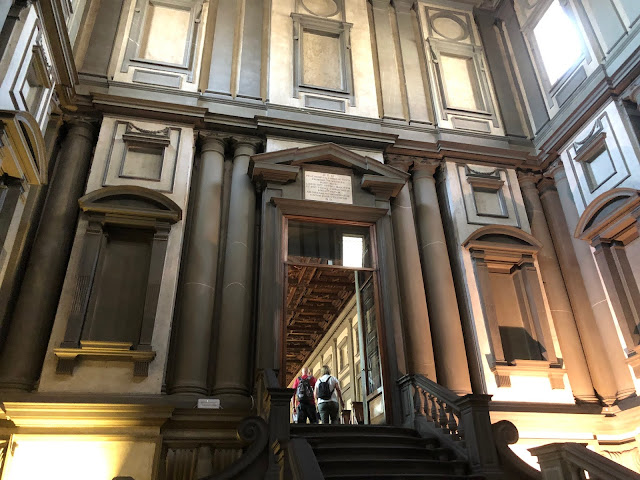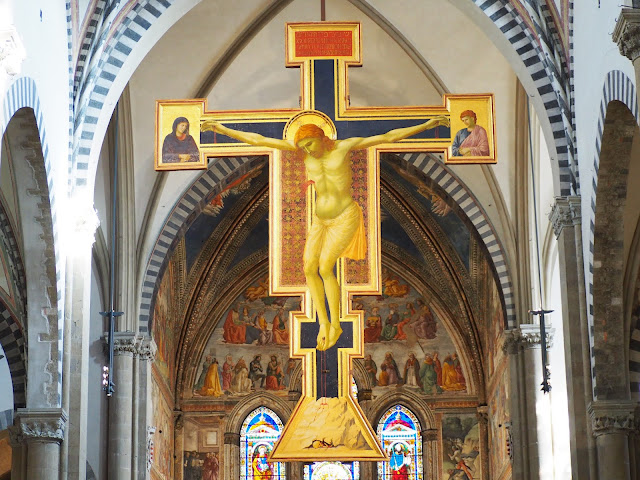【フィレンツェ】サンタ・クローチェ教会 ダンテの記念碑 Firenze - Santa Croce, Dante monument
サンタ・クローチェ教会の内部には、フィレンツェに所縁の人々の巨大な墓廟が並んでいる。
『神曲』を書いたことで知られているダンテも記念碑が立っていた。
これが墓廟ではなく、記念碑というところに、その背景にある複雑な事情が読み取れる。
ダンテ・アリギエーリは、1265年にフィレンツェの金融業を営む家に生まれた。
当時のフィレンツェは、教皇派と皇帝派が対立していて、激しい権力闘争が行われていた。
この闘争は、最終的には教皇派が勝利して政権を掌握した。しかし、その教皇派の中でも対立が起き、フィレンツェの自治を目指す白派と教皇との関係を深めようとする黒派に分裂してしまった。
ダンテは、教皇派の中でも白派に属していて、成人すると百人委員会の一員になり、その後は主要なポストについて市政にも深く携わっていた。
しかし、1301年に黒派がクーデターを起こして政権を奪取し、白派の主要人物だったダンテはフィレンツェを永久追放されてしまった。
その住居は跡形もなく破壊されて、もしダンテがフィレンツェに戻る場合は焚刑に処されるという厳しい処置だった。
その後、ダンテはイタリア北部を放浪して、2度とフィレンツェに戻ることはなかった。
1318年頃にはラヴェンナに落ち着いて『神曲』を書き始め、1321年に完成させてその年に亡くなった。
そのため、ダンテの墓はそのラヴェンナにある。
ダンテの名前は次第に忘れられていったが、19世紀にロマン主義が広まると、ドラクロワなどが『神曲』をテーマにした作品を描くようになり、再び世界的にその名が知られるようになった。
フィレンツェは、たびたびヴェローナにダンテの遺骨の返還を求めたが、ヴェローナは一貫してその申し出を拒否していて、今もその遺骨はヴェローナの地にある。
果たして、ダンテ自身は、フィレンツェに埋葬されることを望んだのだろうか、それとも生前にように2度と足を踏み入れたとは思わなかったのだろうか。
この記念碑の前に立つと、その複雑なダンテの心情に思いを馳せてしまう。
Inside the church of Santa Croce, there are huge mausoleums of people related to Florence.
A monument stood in Dante, who is known for writing "Divine Comedy."
This is not a mausoleum, but a monument, and the complicated circumstances behind it can be read.
Dante Alighieri was born in 1265 to a financial business in Florence.
In Florence at that time, the papal and imperial factions were at odds with each other, and there was a fierce power struggle.
The struggle eventually came to power with the papal victory. However, a conflict arose within the Pope, splitting into a White faction aiming for Florence's autonomy and a Black faction trying to deepen the relationship with the Pope.
Dante was a member of the White sect of the Pope, became a member of the Hundred People Committee when he was an adult, and was deeply involved in the city administration for major posts thereafter.
However, in 1301, the Black faction couped and seized power, and Dante, the main figure of the White faction, was permanently banished from Florence.
The dwelling was destroyed without a trace, and if Dante returned to Florence, he would be burned at the stake.
After that, Dante roamed northern Italy and never returned to Florence.
Around 1318, he settled down in Ravenna and began writing "Divine Comedy," which he completed in 1321 and died that year.
Therefore, Dante's Tomb is in Ravenna.
The name of Dante was gradually forgotten, but when romanticism spread in the 19th century, Delacroix and others began to draw works with the theme of "Divine Comedy", and the name became known worldwide again. It was.
Florence often asked Verona to return Dante's remains, but Verona consistently refused the offer, and the remains are still in Verona.
Did Dante himself want to be buried in Florence, or did he never think he would set foot again as he did in his lifetime?
Standing in front of this monument reminds me of the complex feelings of Dante.
(Translated by Google Translate)



コメント
コメントを投稿